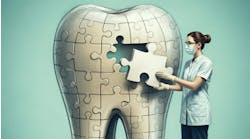Part 2
The Art of Asking Questions
3M Dental is proud to sponsor the Dental Economics year-long "Mastering the Art of Communication" series.
Sandy Roth
The ability to ask great questions may be the most important tool in your practice. It may even be more important than your handpiece. Imagine a lovely day, and, as you are walking down the street, a car pulls over to the curb. The driver leans out the window. "Excuse me," he says, "could you give me some directions?"
"Certainly," you reply, "turn left at the next corner. Go down three blocks - you`ll see a bank on the right - turn left at the intersection and pull into the parking lot next to the pet store." Your directions are precise. You are clear in what you conveyed. If he follows your directions, he will, indeed, get to where you directed him.
The problem, of course, is that you didn`t ask him where he wanted to go.
This story plays out in dental terms in practices all over the United States every day. Dentists and their teams have become very skilled at telling people how to get "there" with their dental care. They are not as skilled in asking patients where they want to go in the first place. Thus, the direction of the entire professional relationship can potentially be shifted many degrees off the mark by failing to ask simple questions: "How would you like us to help you? Where would you like to go?"
Many people believe good communication is simply a matter of good verbal skills. If only they could come up with better words, they would be better communicators. On the contrary, communication is more about curiosity, asking questions, and listening. To children, asking questions comes naturally, since children are intensely curious about the world around them. When they see something new or when an idea comes to them, they usually just blurt out a question. "What`s that, Daddy?" "Why did she say that, Mom?" Sadly, most societies quash this curiosity when it runs afoul of an adult agenda. As a result, many adults must learn again how to let their curiosity run free. It isn`t unusual for an adult to wonder about what a person meant by a phrase or a response. Yet, we often fail to ask simple questions that would provide the answer.
People are often reluctant to ask even the most obvious questions because they are unsure of what to say after they hear the response. They feel the need to figure out the entire dialogue before they begin, so they never begin. "What should I say if she says no?" (The answer may be, "Gosh, I wasn`t prepared for that response. I`ll need to think some more about this.") One important principle of communication is very simple: You don`t get to read the other person`s lines; you only get to say your lines - but you must say yours.
Here is a hypothetical situation for testing your instincts. Irene Shanahan has just come into the office, arriving for her hygiene appointment. Almost immediately, she blurts out, "I know I haven`t been flossing as much as I should." OK, think fast. How would you typically respond?
Please now consider this important principle: Judgment crowds out curiosity. Assume you believe, based on your training, that plaque "should" be removed every 24 hours and that dental floss is the method of choice. From a clinical perspective, this means that, if your patient is not flossing once every 24 hours, she is not flossing enough. So when she tells you she isn`t flossing enough, there`s very little about which to be curious. Now you are in judgment, and you cannot enter a state of curiosity. The door to curiosity is blocked by that judgment.
If you can stay out of judgment initially, however, the door can open and you are free to wonder about any number of things. When a patient says, "I haven`t been flossing as much as I should," what arouses your curiosity and keeps you from going into judgment?
What may come to mind now is a simple question: "How much do you think you should be flossing, Irene?" Of course, there are many more questions that can arise when we move out of judgment and into curiosity. We begin to wonder about what tells Irene how much is enough for her? Where does she get her rules? And why is she telling me that she has not flossed enough? Is she simply documenting her behavior? Or is she keeping us at arm`s length so we won`t scold her for not flossing enough?
Curiosity is indeed a curious thing. Once we unleash it, it prompts us to ask more questions.
Now let`s look at another example. Jack Blalock has been a patient in your practice for several years. He is a young executive in a brokerage house and seems to be a rising star in his company. He is a very pleasant patient. Today, he arrived a bit late for his appointment and seemed hurried. He was scheduled to have a periodic examination, prophy, and some cavity-disclosing radiographs. As he sits in the chair, he says, "By the way, I don`t want any X-rays this time."
Where does your thinking go when you hear this type of comment? It is easy to go to judgment, isn`t it? If you`re like many of your peers, your first thoughts are really groans. You`ve heard this comment too many times. "Not from Jack Blalock!" you think to yourself. You thought he was smarter than that. After all, doesn`t he know that there`s very little radiation in dental X-rays? You wonder if 20/20 or Dateline aired another scary exposé about the horrors of unnecessary dental X-rays.
Remember that when you stay in judgment, you block out the curiosity you will need in order to ask the best questions and communicate effectively. At times like this, you may need to take a big mental eraser and get rid of your judgment. The most basic question that comes to my mind is, "What is that about, Jack?" It`s so obvious, yet many people would not venture forth with that question for fear of sounding confrontational.
One of the most wonderful questions you can use is a simple expression of curiosity and interest: "Really?" The word "really" invites the person to tell you more. Jack says, "By the way, I don`t want any radiographs this time." You respond, "Really?" You will be amazed with how little you have to say to encourage a person to tell you more. Most people want to tell their stories, reveal their thoughts, and share their feelings. In general, patients don`t want to remain mysterious. Often, they just don`t know how to reveal themselves. That may be, in part, because we have not always responded to their overtures in an encouraging way.
A few simple guidelines can help you become a more effective questioner. Consider the following:
> Clarify your intentions and announce them. Many people are reluctant to ask questions because they are afraid the other person will misunderstand their intentions. If that is a concern for you, simply identify your intention, announce it, and then ask your question. For example, "Mr. Blalock, I want to make sure I understand what concerns you have about radiographs." You might also identify what you don`t intend as well as what you do intend. For example, "Susan, I certainly don`t want to embarrass you, but I do want to understand what you mean when you say `afraid of needles.` Can you tell me more about that?" Fear of being misunderstood is no reason to limit your communication. You will almost always be misunderstood if you don`t communicate at all. If you feel insecure in asking clarifying questions, preface them with this type of statement, and it will give you courage to go on.
Don`t overlook the importance of clarifying your intentions first. If you do intend to embarrass, manipulate, or coerce, do not go any further until you are able to address your own motivations. If you can`t say it to the patient, don`t do it.
> If the answer won`t make a difference, don`t ask. Disregarding the answer to a question you`ve asked is dishonoring and rude. There`s a simple rule here: Don`t ever ask a question if you have no intention of incorporating the answer into your thinking, or if the answer has no chance of influencing what you do. There are many purposes for asking questions, and one of the most important is to help you learn. Thus, the answer to your question provides learning material that must influence your next step.
> Don`t ask trick questions. One trick question is, "Mrs. Jones, do you want to keep your teeth for a lifetime?" There is a definite "right" answer, and both of you know it. Trick questions like this are usually a way of running an agenda on a person without putting yourself on the line.
If you have a position, say so. If you want to understand what the other person wants, ask a genuine question. For example, you might say, "Mrs. Jones, I`m wondering what you expect for your teeth?" Then be quiet and let the patient tell you how she thinks. This is important information for you to have, and it will help you build a more honest relationship.
> Check your judgments at the door. Preconceived notions and judgments will alter not only the questions you ask, but also the way you are disposed to hear responses. When building relationships with patients, you must temporarily set aside your opinion - as educated as it may be - of what they "ought" to do for themselves. This is very difficult for many people in dentistry to do, because they have a great wealth of information and education. There will be a time to introduce your clinical opinion, but the first step is to understand how the patient is thinking and feeling.
> Acknowledge your shifts in perception and thinking. When good questions are asked, you will receive good information in response. If your mind is open, this will influence how you see things and how you shift or modify subsequent questions. When this happens, label your shifting perceptions for others so they understand how you are thinking now. Examples include, "Well, I`ve never thought about it that way," or, "I can understand why that would be a concern for you. I`m open to looking at a different approach given what you have just told me."
> Stay in the question, not in your answer. You only get to pre-plan the first question. After that, subsequent questions must be generated in the context of the responses you receive. Many people only half-heartedly listen to an answer because their mind is occupied formulating the next statement or question rather than listening fully and staying curious.
Staying in the question is like eating an artichoke. Each leaf you remove reveals more tender leaves and eventually you get to the core of the matter - the heart. Patients frequently have not fully thought about what they want and why they want it. Your questions will help them do just that.
Y Listen for engagement. Engagement is when your patient is working harder than you are. When engagement occurs, the patient will often begin asking the questions.
This is powerful! The tricky part is that you can?t schedule a time for your patient to be engaged. They can become engaged, and often do, during the last five minutes of an appointment after they have had some time to consider earlier comments.
When the patient is engaged, shift yourself to his or her agenda and ask questions to further the thinking process. Following their lead will encourage patients to participate in this way so that they can come to own their problems ? and ultimately the solutions as well.
Y Know when enough questions have been asked. Skillful questioning does not require bare light bulbs and rubber hoses. Questions must be asked gently and with respect. Knowing when it is time to move on is a subtle skill that can be developed when you pay attention to how people respond to your inquiries. When you have reached the end of the road, stop.
You can always put in a verbal bookmark to reserve the spot to which you can later return. For example, OJack, I?d like to speak some more about this the next time we see you. Perhaps you will have a few new ideas at that time.O Avoid badgering and annoying a patient who clearly has had enough. Better yet, ask the patient to let you know when your questions are no longer useful.
Y Choose open-ended over closed-ended questions. Closed-ended questions, those that can be answered by OyesO or Ono,O rarely reveal anything other than agreement or denial. An open-ended question will allow a wide range of information to be revealed. In almost all cases, an open-ended question is more appropriate in a helping relationship. Sometimes an open-ended question won?t even sound like a question at all. An example of a great open-ended question is, OI?d like to understand a bit more about the choices you have made in the past.O
Remember that the question is one of the most important tools you can use in helping patients as they make choices about their dentistry. Those dentists and team members who become skilled questioners will be better communicators. And since communication is all about forming better relationships, the entire practice will be the beneficiary.
For more information about this article, contact the author at (800) 848-8326. Biographies of the authors appear on page 8.





